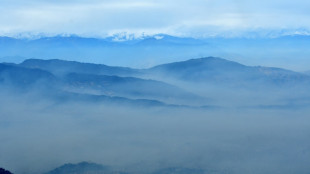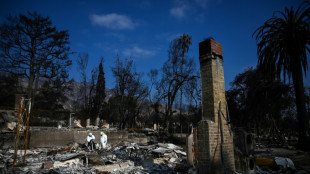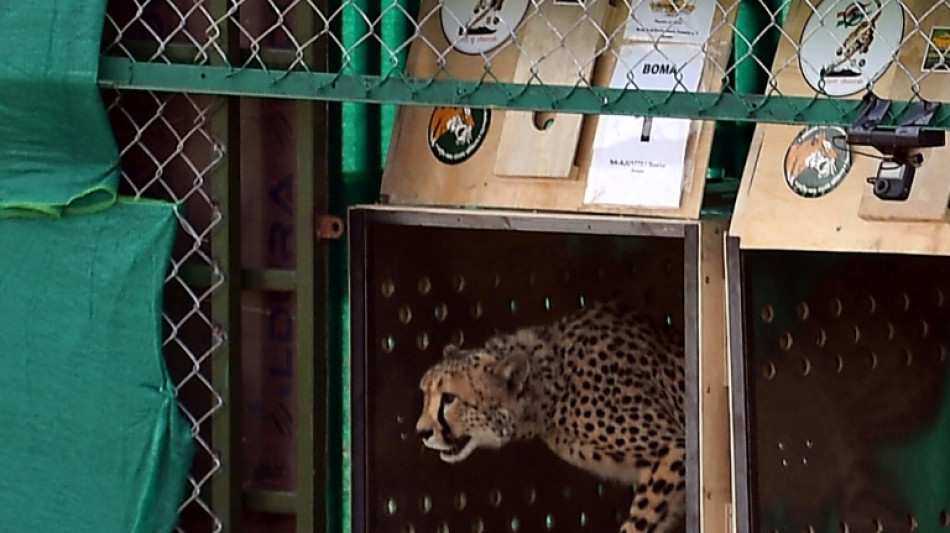
-
 Where Trump's tariffs could hurt Americans' wallets
Where Trump's tariffs could hurt Americans' wallets
-
Trump says 'very close to a deal' on TikTok

-
 Trump tariffs on Mexico: the good, the bad, the unknown
Trump tariffs on Mexico: the good, the bad, the unknown
-
Postecoglou denies taunting Spurs fans in Chelsea defeat

-
 Oscar-winning Palestinian director speaks at UN on Israeli settlements
Oscar-winning Palestinian director speaks at UN on Israeli settlements
-
With tariff war, Trump also reshapes how US treats allies

-
 Fernandez fires Chelsea into fourth as pressure mounts on Postecoglou
Fernandez fires Chelsea into fourth as pressure mounts on Postecoglou
-
South Korea court to decide impeached president's fate

-
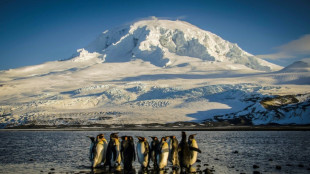 Penguin memes take flight after Trump tariffs remote island
Penguin memes take flight after Trump tariffs remote island
-
E.T., no home: Original model of movie alien doesn't sell at auction

-
 Italy's Brignone has surgery on broken leg with Winter Olympics looming
Italy's Brignone has surgery on broken leg with Winter Olympics looming
-
Trump defiant as tariffs send world markets into panic

-
 City officials vote to repair roof on home of MLB Rays
City officials vote to repair roof on home of MLB Rays
-
Rockets forward Brooks gets one-game NBA ban for technicals

-
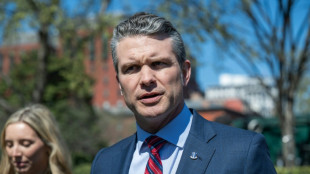 Pentagon watchdog to probe defense chief over Signal chat row
Pentagon watchdog to probe defense chief over Signal chat row
-
US tariffs could push up inflation, slow growth: Fed official

-
 New Bruce Springsteen music set for June 27 release
New Bruce Springsteen music set for June 27 release
-
Tom Cruise pays tribute to Val Kilmer

-
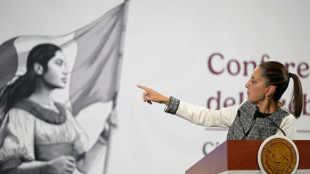 Mexico president welcomes being left off Trump's tariffs list
Mexico president welcomes being left off Trump's tariffs list
-
Zuckerberg repeats Trump visits in bid to settle antitrust case

-
 US fencer disqualified for not facing transgender rival
US fencer disqualified for not facing transgender rival
-
'Everyone worried' by Trump tariffs in France's champagne region

-
 Italy's Brignone suffers broken leg with Winter Olympics looming
Italy's Brignone suffers broken leg with Winter Olympics looming
-
Iyer blitz powers Kolkata to big IPL win over Hyderabad

-
 Russian soprano Netrebko to return to London's Royal Opera House
Russian soprano Netrebko to return to London's Royal Opera House
-
French creche worker gets 25 years for killing baby with drain cleaner

-
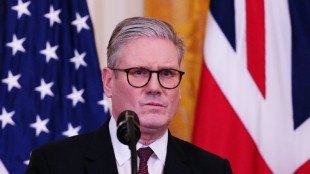 UK avoids worst US tariffs post-Brexit, but no celebrations
UK avoids worst US tariffs post-Brexit, but no celebrations
-
Canada imposing 25% tariff on some US auto imports
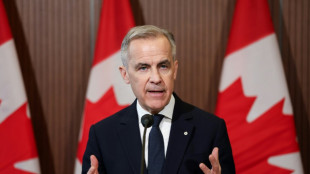
-
 Ruud wants 'fair share' of Grand Slam revenue for players
Ruud wants 'fair share' of Grand Slam revenue for players
-
Lesotho, Africa's 'kingdom in the sky' jolted by Trump
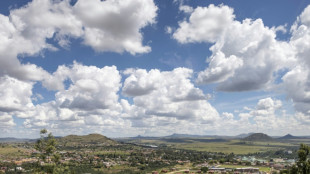
-
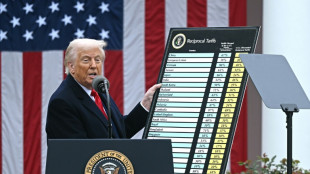 Trump's trade math baffles economists
Trump's trade math baffles economists
-
Gaza heritage and destruction on display in Paris
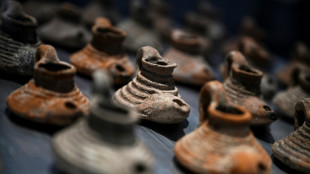
-
 'Unprecedented crisis' in Africa healthcare: report
'Unprecedented crisis' in Africa healthcare: report
-
Pogacar gunning for blood and thunder in Tour of Flanders

-
 Macron calls for suspension of investment in US until tariffs clarified
Macron calls for suspension of investment in US until tariffs clarified
-
Wall St leads rout as world reels from Trump tariffs

-
 Mullins gets perfect National boost with remarkable four-timer
Mullins gets perfect National boost with remarkable four-timer
-
Trump tariffs hammer global stocks, dollar and oil

-
 Authors hold London protest against Meta for 'stealing' work to train AI
Authors hold London protest against Meta for 'stealing' work to train AI
-
Tate Modern gifted 'extraordinary' work by US artist Joan Mitchell

-
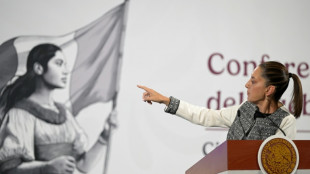 Mexico president welcomes being left off Trump's new tariffs list
Mexico president welcomes being left off Trump's new tariffs list
-
Tonali eager to lead Newcastle back into Champions League

-
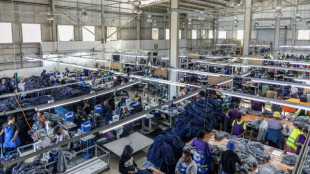 Lesotho hardest hit as new US tariffs rattle Africa
Lesotho hardest hit as new US tariffs rattle Africa
-
Stellantis pausing some Canada, Mexico production over Trump auto tariffs

-
 Rising odds asteroid that briefly threatened Earth will hit Moon
Rising odds asteroid that briefly threatened Earth will hit Moon
-
Italy reels from Brignone broken leg with Winter Olympics looming

-
 Is the Switch 2 worth the price? Reviews are mixed
Is the Switch 2 worth the price? Reviews are mixed
-
Ancelotti’s tax trial wraps up in Spain with prosecutors seeking jail

-
 Civilians act to bring aid to Myanmar earthquake victims
Civilians act to bring aid to Myanmar earthquake victims
-
US trade gap narrows in February ahead of bulk of Trump tariffs


Top Indian wildlife official removed after 8 cheetahs die
A top Indian wildlife official has been removed after a scheme to relocate cheetahs from Africa saw eight felines die, raising questions about the high-profile project.
Asiatic cheetahs were declared extinct in India in 1952 but their African cousins were reintroduced last year as part of a plan championed by Prime Minister Narendra Modi.
Eight cheetahs were brought in from Namibia, followed by another 12 from South Africa in February, with Modi presiding over the release of the first arrivals at the Kuno National Park in Madhya Pradesh state.
Eight cheetahs have died in the last four months, with wildlife authorities attributing the deaths to natural causes.
But the top wildlife official in Madhya Pradesh, Jasbir Singh Chauhan, was transferred from his post by the state forest department on Monday, it said in a statement without giving reasons for his removal.
Indian media reports have linked the transfer to the cheetah deaths, citing sources saying that there were concerns over the project's management.
Of the eight cheetahs that died, five were translocated animals, plus three of the four cubs born since their arrival -- renewing concerns among experts about the project's viability.
On Sunday, the environment ministry had said it would be premature to declare the programme a success or failure "since cheetah reintroduction was a long-term project".
It also said that global experience, particularly from South Africa, showed that the initial phases of reintroductions resulted in more than 50 percent mortality.
But wildlife conservationist Praveen Bhargav told AFP Tuesday that the cheetah reintroduction programme was bound to fail as many fundamental issues had been ignored.
"I believe the prime minister has unfortunately been misled by some bureaucrats and experts," he said.
"We neither have the expansive grassland habitats that cheetahs need nor other ecological conditions to attempt such a complicated reintroduction," he said.
"This was a very good, headline grabbing event but the harsh reality kicks in, as we are now witnessing after eight cheetahs have died."
- 'Disappointing' start -
Arjun Gopalaswamy, a wildlife and statistical ecologist who studies large carnivores, said there should be more transparency about the causes of death.
Media reports have cited officials saying some of the animals could have died as a result of infections caused by their radio tracking collars.
The project's start was "disappointing", Gopalaswamy told AFP, as seven out of the eight deaths had happened inside the enclosures "where such incidents were least anticipated".
With one possible exception -- a female killed by her partner while mating -- a lack of information from authorities "obscures the primary causes behind all the deaths", he said.
"From a scientific perspective, this ambiguity is worrisome as it prevents meaningful learning from these occurrences," he said.
Scientists from the Cheetah Research Project at Leibniz-IZW in Namibia had earlier said the relocation programme ignored "spatial ecology", as the Kuno National Park was much smaller than the spaces the big cats usually need to thrive.
The reintroduction is the first intercontinental relocation of cheetahs and the programme aims to bring in about 100 of the animals over the next decade.
Cheetahs are one of the oldest big cat species, with ancestors dating back about 8.5 million years, and they once roamed widely throughout Asia and Africa in great numbers.
But today, after their extinction from many countries across the Middle East and Asia, only around 7,000 remain, primarily in the African savannahs.
A.Mahlangu--AMWN
